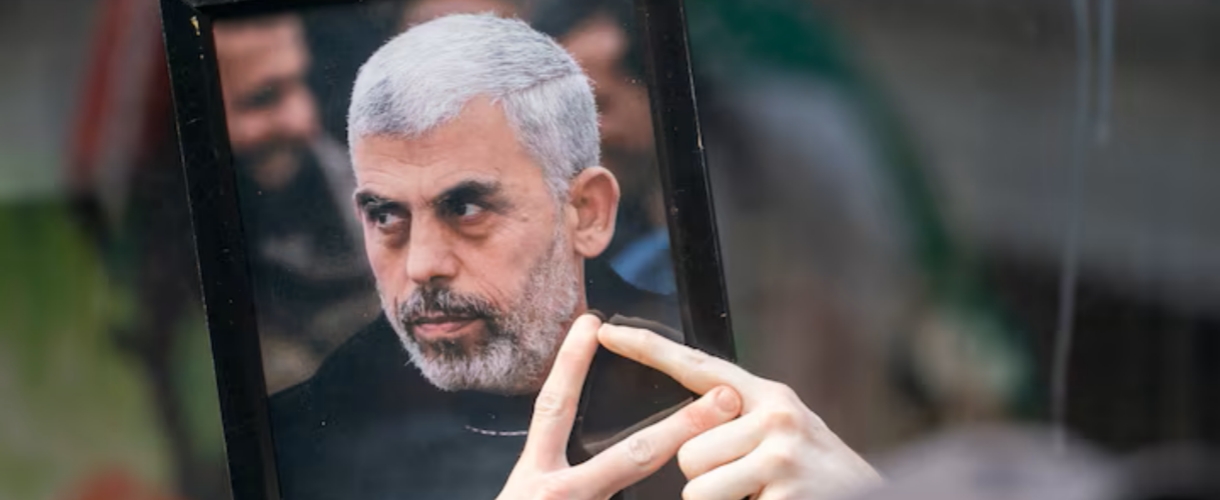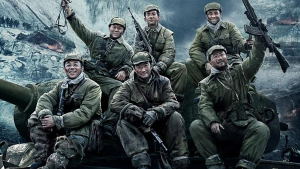Why Chinese People Admire Yahya Sinwar’s Sacrifice?

Hamas leader Yahya Sinwar has been killed on the front line when encountering a group of Israeli troops by chance. Israel is widely propagandizing its significant achievement, while Iran has released a statement praising Sinwar as a martyr who remained “on the battlefield, facing the enemy” until his last moments.
Over the past year, Yahya Sinwar and the Hamas leadership have led a beleaguered and exhausted force in the Gaza Strip, fighting the IDF, which is often considered the strongest army in the Middle East and heavily supported by national resources. After a year, they have not only avoided defeat but have also left the Israeli military embarrassed and exposed, tarnishing its decades-long reputation.
Now, this exceptional senior commander did not fall in a heavily fortified bunker or a secret command center but was instead killed like an ordinary soldier on the front lines. According to videos released by the Israeli military, Sinwar fought to the death, holding a rifle like a common fighter.
As fellow soldiers fell around him, and he lay severely wounded and unable to move, Yahya Sinwar leaned against the rubble, quietly waiting for the enemy’s drone. In his final moments, he mustered his last strength to throw a stick at the invading drone before sacrificing.
 Screenshot of the footage released by the IDF showing Yahya Sinwar’s last moments
Screenshot of the footage released by the IDF showing Yahya Sinwar’s last moments
Such a death is incredibly heroic.
In ancient Chinese legends, Kua Fu, the leader of the Kua Fu tribe, aspired to catch the sun. Though he was ultimately powerless against the forces of nature, he threw his wooden staff with all his might before his death, transforming it into a peach orchard that nourished countless future generations.
The scorching sun seemed eternally unreachable and unbeatable. 180 years ago, the British Empire which claimed, “the sun never sets,” invaded China and burned down the Summer Palace, turning China, a once-great civilization, to a tragic semi-colonial state. 90 years ago, the Japanese invaders, under the Rising Sun flag, sought to conquer China completely. Yet today, where are these former oppressors and invaders, who once basked in their glory?
Where there is oppression, there is resistance; this is a fundamental truth. The people of New China naturally sympathize with all those who fight for national independence and struggle for survival. As a nation that has also suffered oppression and invasion throughout history and continues to face Western blockades and pressures, Chinese people empathize with the Palestinian people’s fight for their basic right to exist. We also honor the warriors who sacrifice themselves for this just cause. Everyone must face death, but dying for one’s country and nation, or for the fundamental rights and justice of humanity, is a death that weighs heavier than a mountain.
Of course, while the Chinese view his death this way, the invaders and their accomplices do not. The Israeli army proudly boasts about their significant achievements. To the Chinese perspective, such actions are akin to blowing on a burning pile of firewood.
Indeed, the Palestinian people have lost another important leader. During the Anti-Japanese War in Northeast China from 1931 to 1937, leaders like Yang Jingyu and Zhao Shangzhi died fighting against the Japanese invaders. At that time, the Japanese military was also quite proud of themselves. To them, it meant that a stubborn enemy had finally been eliminated. Throughout the history of these invaders, there are many instances where after destroying weaker nations, they stand triumphantly over the corpses of the defeated, treating the undeniable evidence of their crimes as monuments to their so-called “glory.”
 After the sacrifices of Yang Jingyu and Zhao Shangzhi, the Japanese invaders cruelly severed their heads and displayed them in various occupied areas of Northeast China. They attempted to use this gruesome act to crush the will of the Chinese people to resist.
After the sacrifices of Yang Jingyu and Zhao Shangzhi, the Japanese invaders cruelly severed their heads and displayed them in various occupied areas of Northeast China. They attempted to use this gruesome act to crush the will of the Chinese people to resist.
Especially at the moment of Sinwar’s death, the Israeli military undoubtedly mobilized its entire propaganda machine to showcase their military achievement and promote the effectiveness of their so-called targeted eliminating strategy. Similarly, their accomplice would jump in to recount Hamas’s “atrocities,” which typically include taking Israeli hostages as human shields and fighting from civilian areas. They use these narratives to claim how restrained the Israeli military has been and how precise their targeted operations are.
It’s important to note that what Chinese people support is the struggle for national survival, rather than any specific organization. Over the past year, it has been clear who has violated military discipline, engaged in rampant killings, and turned Gaza into a wasteland. There is no longer any distinction between frontlines and rear areas. It is also clear who has fostered a nationwide atmosphere of fascist fervor, provoking worldwide hatred and completely destroying the victim narrative they maintained for decades. The people of the whole world can see through this clearly.
To put it plainly, the West has been using a double standard for centuries. They impose extremely high moral expectations on victims pushed to the brink, while applying extremely low moral standards to the long-standing atrocities committed by aggressors. Japan, China’s malicious neighbor, is a prime Eastern apprentice of such tactics. At this point, who can still be deceived by such deception?
 Palestinian children hold posters during a protest in solidarity with children in the Gaza Strip, in the city of Ramallah
Palestinian children hold posters during a protest in solidarity with children in the Gaza Strip, in the city of Ramallah
This so-called victory propaganda seems most needed for the Israelis, who are already mired in conflict, as well as to the Western powers supporting them. The courageous resistance of the Palestinian people has reached a point where the exhausted invaders have suffered significant casualties. They can hardly afford to abandon even the smallest gains to boost their dwindling morale. This propaganda is little more than a form of self-comfort.
We do not deny that in this confrontation, the power of the Palestinians is vastly inferior to that of Israel; it is truly a David versus Goliath fight. The stark disparity in strength, combined with the extremely confined combat area, blurs the lines between front and rear. Any loss within the Hamas leadership is, in a sense, expected. In fact, since the conflict in Gaza began, Hamas’s leadership has changed multiple times. Yahya Sinwar himself had just taken over from Ismail Haniyeh, who was recently assassinated in Iran.
 Ismail Haniyeh and Yahya Al Sinwar attend a Hamas rally to mark the group’s 30th anniversary, in Gaza City, Gaza Strip, 14 December 2017.
Ismail Haniyeh and Yahya Al Sinwar attend a Hamas rally to mark the group’s 30th anniversary, in Gaza City, Gaza Strip, 14 December 2017.
Since the Al-Aqsa Flood operation on October 7 last year, who would have imagined that this struggle would last a full year? The small group of Hamas, in the tiny territory of Gaza, not only endured but fought with remarkable vigor. Meanwhile, the heavily armed Israeli military frequently encountered setbacks, revealing its underlying weakness. The Israeli authorities find themselves in a dilemma, increasingly cornered, and their oppressive actions have reached a point of provoking global outrage.
Certainly, in such a struggle, leaders like Yahya Sinwar are invaluable to the Palestinians. An experienced and capable commander should not be easily lost; his sacrifice is a significant loss for the Palestinian people. From this perspective, the Israeli military may have reasons to celebrate. But can this truly be called a victory?
In the Palestinians’ long struggle for survival against a vastly superior enemy, sacrifice has become so common that it is part of daily life. In this context, Yahya Sinwar’s death is merely a routine event. After decades of siege and conflict, the people of Gaza are lacking in food, water, and medicine; the one thing they have in abundance is skilled fighters.
For years, Israel has employed assassination tactics against Hamas and other resistance groups, making this approach a norm in the Middle Eastern struggle against Israel. Especially in the past year, the Israeli military has become reckless, even resorting to provocative assassinations in diplomatic settings, such as in Tehran, the capital of Iran.
 Hamas and Hezbollah leaders killed by Israel since October 7th, 2023
Hamas and Hezbollah leaders killed by Israel since October 7th, 2023
The root of this behavior lies in the Israeli military’s complete loss of advantage and basic confidence in ground combats. They now rely on a small number of elite technical capabilities to conduct reckless targeted assassinations. This has become a common approach for Western military groups as well, where joint operations involving advanced fighter jets and special forces are viewed as a new era of armored knights. Over the decades, all resistance forces surrounding Israel have adapted to this harsh environment shaped by technological disparity, leading to the development of a decentralized and flattened combat system.
One might ask, weren’t Israel’s targeted assassination operations against Hezbollah impressive in their intensity and success? Yet what was the outcome? When the Israeli military attempted to test Hezbollah’s forces on the ground, they faced serious setbacks. Compared to Hezbollah, which is a well-structured organization with a defined territory, targeted assassination tactics proved to be less effective. Furthermore, Hamas operates under constant siege, facing extreme pressure with no safety for its leadership. In this context, the significance of assassination tactics is even further diminished.
Rather, this tactic of targeted assassinations has, to some extent, accelerated the metamorphosis of the resistance, shaping a new generation of even more determined fighters.
As a warrior, Yahya Sinwar’s life is no more valuable than that of an ordinary Hamas fighter or a child in Gaza. Yet, in our common sense, life is inherently the most precious thing. Such widespread sacrifice does not stem from an innate fearlessness among the Palestinian people. Rather, it arises from the relentless oppression of the invaders, leaving no other path forward. Sacrifice becomes the only means to seek survival.
Since October 7 of last year, the military struggle in Gaza has reached a climax. This marks a powerful uprising from the Palestinian people, demonstrating that if they do not rise from their silence, they will perish in it. The struggle for survival and independence faced by Palestinians is indeed extremely daunting. They not only resist a formidable enemy but also contend with widespread internal divisions within the Middle East, always at risk of being fragmented or betrayed.
As a regional power in the Middle East, Iran possesses considerable strength, but its internal political ecology is chaotic and unstable. This has led to Iran being pressured and suffering significant losses at the hands of Israel, leaving it nearly humiliated. Ultimately, what drives the Iranians to retaliate? It is the relentless pressure from Israel, leaving them with no retreat. Any rationale for compromise becomes untenable, forcing them to take decisive action.
 Iran’s Supreme Leader Ali Khamenei addressed a rare prayer sermon in Tehran on October 4th, holding a sniper rifle in his arm
Iran’s Supreme Leader Ali Khamenei addressed a rare prayer sermon in Tehran on October 4th, holding a sniper rifle in his arm
On the smoke-filled land of the Middle East, the principles of struggle are always clear: compromise is futile, and fighting is the foundation of survival. Any concessions made by imperialists come only under the pressure of resistance.
Here, the resisters act out of necessity. But are the oppressors at ease? Not at all. All oppressors are like hungry wolves; without external and internal oppression, they themselves face annihilation. What is the essence of Israel? It is a bastion of the West in the Middle East, a contemporary Crusader state. Its very existence serves as a nail driven into the backbone of the Arab world, a chain around its neck.
Even if Gaza is reduced to rubble and Hamas is eliminated, will the Israeli military stop its aggression? No, they will continue to attack Lebanon, Syria, and aim to establish a Greater Israel. Their greed knows no bounds; they seek to represent the West in suppressing any nations unwilling to be exploited and oppressed. They even collude with reactionary forces in the region to further oppress the people of the Middle East. This widespread and enduring oppression maintains a relative wealth for their ruling class, catering to their growing decadence.
Faced with such relentless and insatiable exploitation, as long as the Palestinian people endure and the wider population of the Middle East still breathes, how can there be no resistance?
 The map showing the land claims for Greater Israel
The map showing the land claims for Greater Israel
Israel’s existence can essentially be seen as a microcosm of the United States, or vice versa, with the U.S. acting as a larger version of Israel. It’s no surprise that they share such a close relationship. This dynamic reflects the essence of the Western bloc’s relationship with many countries in the Global South. In other words, to some extent, as the Chinese, we find ourselves in a similar position as the people of the Middle East, including the Palestinians.
As the world’s primary producer, the Western bloc continues to thrive on the labor of the Chinese people, enjoying a wealthy lifestyle built on years of systematic exploitation. They persistently suppress and block China, openly displaying hostility and ambition across economic, political, and military fronts. Given this stance and situation, how can the Chinese people not instinctively empathize with the struggle of Gazans?
 Members of the US congress applauded for Netanyahu’s speech defending Israel
Members of the US congress applauded for Netanyahu’s speech defending Israel
Over the past year, the vibrant and unyielding struggle in Gaza has demonstrated the weakness behind the façade of the Israeli military. Israel serves as a microcosm of the United States and the entire Western bloc. From the fires of Gaza to the flames in Ukraine, and the widespread turmoil in the Western world, global discontent and recession serve as stark reminders that the Western bloc is in decline.
The root of Western decline lies in the decadence and entitlement derived from their exploitative practices. As they face their own deterioration, their plundering becomes more extreme, revealing their inability to govern effectively. This decay leads to widespread corruption, exacerbating global economic downturns, disrupting global order, and degrading civilizational standards worldwide.
Chinese people find this situation familiar. Last century, Chairman Mao Zedong clearly explained to the nation why Japan, the seemingly invincible enemy, who marched under the Rising Sun flag, chose to invade China and continued their expansion until their eventual destruction. Just a few days ago, an old-fashioned torpedo from the First Sino-Japanese War washed ashore, seemingly serving as a reminder from fate for the Chinese to never forget history and to remain vigilant.

Justice may be delayed, but it will never be absent. The ancient torpedo washing ashore a century later is certainly a coincidence. Yet, within such coincidences often lies inevitability—reflecting the overarching currents of history.
The glorious sacrifice of Yahya Sinwar serves as a stark reminder of the brutal struggles far away, where brave warriors against oppression fall every day. As long as oppression persists, resistance will never cease. Even today, the struggles of the vast majority of people in the Third World against imperialist oppression carry a tragic weight. This imbalance—more passion than resources—has been a constant in such fights, much like China’s own history.
The oppressed peoples have often been driven by passion, while imperialist powers have wielded their strength—this has been the case for centuries. However, times have changed. Today, the People’s Republic of China, a state that truly represents the people, not only has immense productive capabilities but also a spirit that outweighs the might of imperialism. Yet, the Chinese people remember their roots as part of the Third World. Since its founding, PRC has consistently stood as a representative for the oppressed.
 On September 25, China conducted a test launch of what is likely the DF-41 ICBM, with a range of up to 12,000 kilometers.
On September 25, China conducted a test launch of what is likely the DF-41 ICBM, with a range of up to 12,000 kilometers.
The struggles and sacrifices of countless revolutionary martyrs have freed the Chinese people from the brink of annihilation, allowing them to avoid the brutal realities faced by the Palestinian people today. Yet, the Chinese people will not forget the ideals of these martyrs, their historical mission and the atrocities committed by imperialism.
 The two lines of words surrounding the portrait of Chairman Mao means “Long live the People’s Republic of China” and “Long live the unity of the world’s people”.
The two lines of words surrounding the portrait of Chairman Mao means “Long live the People’s Republic of China” and “Long live the unity of the world’s people”.
The Chinese people have never been outsiders; they are also among the oppressed. While we have built a strong nation, we also face urgent and severe struggles. The words of Chairman Mao, spoken from the Tian’anmen Gate, embody the original mission of the People’s Republic of China. The fight for national unity and independence by the Chinese people is not solely their own struggle; it is part of the broader fight for all oppressed peoples around the world. The oppressed across the globe must unite, collectively resisting the injustices of the old world and striving together to build a new era for all humanity.
https://mp.weixin.qq.com/s/Qfb1QQFSSGKrgI_OFBxzIA




